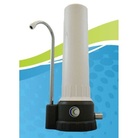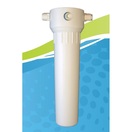Greetings Redditors!
Concerned About Fluoride In Your Drinking Water?
Fluoridation of public drinking water supplies started in the 1940s and has been justified by evidence that fluoride is effective at reducing cavities in both children and adults. However, many believe fluoride in drinking water does more harm than good and is an unnecessary form of “forced” medication.
Many countries, including nearly all of Europe, have discontinued fluoridation. And recently, in August of 2014, Israel outlawed fluoridation. The practice is allowed in many countries and the U.S., and about 70% of the U.S. residents currently receive fluoridated water. However, a long list of cities and communities have rejected fluoridation over the last decade or so.
Is Fluoride Bad For You?
It depends on who you ask and the degree of your exposure. The safety of fluoride in drinking water at levels recommended for preventing tooth decay has been asserted by numerous scientific and professional groups. But hundreds of renowned scientists and researchers around the world condemn, or refuse to endorse fluoridation of the water supply. Exposure to fluoride from other sources is increasing and adds to the exposure from fluoridated drinking water. These other sources include processed foods made with fluoridated water, fluoride-containing pesticides, bottled teas and many juice drinks, fluorinated pharmaceuticals and teflon pans.
Fluoride is unquestionably toxic at certain concentrations. Excessive fluoride exposure is well known to cause a painful bone disease known as skeletal fluorosis and a discoloration of the teeth known as dental fluorosis. Further, exposure to excessive fluoride also has been linked to a number of other disorders such as thyroid disease, gastrointestinal distress, arthritis, glucose intolerance, bone fragility, neurodegenerative diseases and possibly cardiovascular disease and some types of cancer.
NOTE: If your child is consuming infant formula, you should avoid making the formula with fluoridated tap water. Infant formula reconstituted with fluoridated water delivers a very high dose of fluoride to a young baby.
Because of the potential health effects, the U.S. Environmental Protection Agency has established national standards limiting the maximum allowable fluoride concentration in public water supplies. But even those standards have been questioned as perhaps been too lenient in a 2006 comprehensive study on fluoride by the National Research Council. The EPA currently is reconsidering their allowable fluoride concentration standard in view of these findings.
NOTE: If your drinking water is obtained from a private well or from a very small community water supply system, your water probably isn’t subject to state and federal regulation. If your water supply is unregulated, it would be prudent to have your water tested for fluoride -- and perhaps for other contaminants. Fluoride tests are available here and tests for other contaminants are available here.
Fluoride is unquestionably toxic at certain concentrations. Excessive fluoride exposure is well known to cause a painful bone disease known as skeletal fluorosis and a discoloration of the teeth known as dental fluorosis. Further, exposure to excessive fluoride also has been linked to a number of other disorders such as thyroid disease, gastrointestinal distress, arthritis, glucose intolerance, bone fragility, neurodegenerative diseases and possibly cardiovascular disease and some types of cancer.
NOTE: If your child is consuming infant formula, you should avoid making the formula with fluoridated tap water. Infant formula reconstituted with fluoridated water delivers a very high dose of fluoride to a young baby.
Because of the potential health effects, the U.S. Environmental Protection Agency has established national standards limiting the maximum allowable fluoride concentration in public water supplies. But even those standards have been questioned as perhaps been too lenient in a 2006 comprehensive study on fluoride by the National Research Council. The EPA currently is reconsidering their allowable fluoride concentration standard in view of these findings.
NOTE: If your drinking water is obtained from a private well or from a very small community water supply system, your water probably isn’t subject to state and federal regulation. If your water supply is unregulated, it would be prudent to have your water tested for fluoride -- and perhaps for other contaminants. Fluoride tests are available here and tests for other contaminants are available here.
What are your options if you wish to remove fluoride from your drinking water?
Distillation, ion exchange and reverse osmosis water treatment systems are very effective at removing fluoride from water. However, their use may be overkill if your objective is to remove nearly all fluoride from your drinking water. There are several different types of water filter systems that can remove more than 90% of the fluoride from your water, and they’re less expensive and much less complicated to operate and maintain than the other forms of treatment.
A filter element designed specifically to reduce fluoride (and heavy metals), the B-2 Fluoride/Heavy Metals Filter Element, is capable of reducing fluoride levels in your drinking water by as much as 95%. These B-2 Fluoride/Heavy Metals filter elements can be purchased with either a counter-top or under-counter filter housing. Available filter system options with the B-2 Fluoride/Heavy Metals Filter Element are as follows:
A filter element designed specifically to reduce fluoride (and heavy metals), the B-2 Fluoride/Heavy Metals Filter Element, is capable of reducing fluoride levels in your drinking water by as much as 95%. These B-2 Fluoride/Heavy Metals filter elements can be purchased with either a counter-top or under-counter filter housing. Available filter system options with the B-2 Fluoride/Heavy Metals Filter Element are as follows:
A number of other water filter systems also are capable of reducing fluoride levels by as much as 80-90% in addition to reducing many other drinking water contaminants, such as pathogenic micro-organisms, disinfectants such as chlorine, disinfection by-products, inorganic chemicals, organic chemicals and radionuclides. Check out our gravity water filter systems and other counter-top and under-counter water filter systems.







